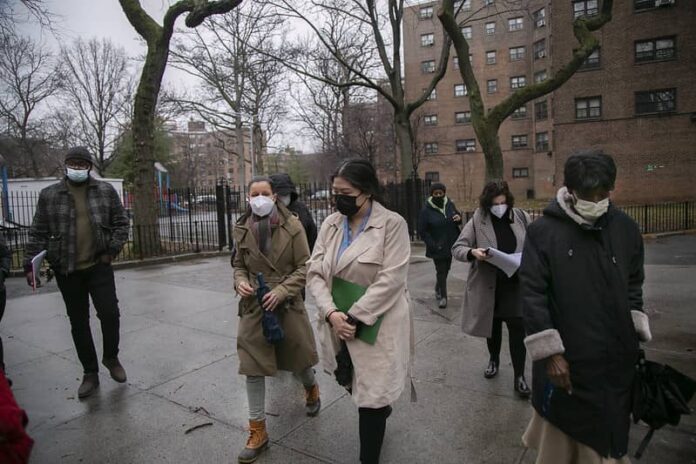Hallets North, a proposed 1,400-unit development that plans to deliver three towers and a public esplanade, received a tepid nod of approval from councilmember Tiffany Cabán. The proposed project’s location is just north of Astoria Queens, located by the intersection of 3rd street and 26th Avenue, so it falls within Cabán’s district. Because Cabán threw her support behind Hallets North, the rest of the city council will likely fall suit, making the project’s passing likely.
The project has been in the works for nine years and took a long time to garner Cabán support. Many local residents and activists are not in favor of the project over the size and design of the project. The towers will be between 23 and 34 stories, which is much taller than the typical building in a low-rise neighborhood like Astoria. Others were concerned that building luxury, market-rate towers in the neighborhood would affect affordability, and potentially push long-time renters out of the area.
Despite these concerns, Cabán officially announced her support for the project during an event outside the property on Tuesday, September 13. She mentioned that she could throw her support behind the project because the developer promised to include more affordable units as a condition of approval. The developer pledged to include 268 units that will rent for below 50 percent of the area median income (AMI). 100 of those units will be set at 30 percent of AMI, which for a family of four would be around $40,000 yearly income.
Halletts North also has support from the Queen’s borough president Donovan Richards, although the support from Richards and Cabán seems to be lukewarm at best. Ultimately, Cabán’s decision to support the project is a result of disliking the alternatives, as opposed to supporting the project itself.
“The best we can hope for without rezoning is a “last mile” facility where some massive corporation like Amazon would pay our neighbors garbage wages for nonstop, back-breaking work,” Cabán wrote in a Twitter thread. “A No vote would have been a vote for that. I cannot and will not in good conscience vote for that.”
However, Cabán also noted the positive effects of the development, such as a public esplanade and increased public safety. Regarding the current land usage, she wrote on Twitter that Halletts North currently “sends the message to residents of Astoria Houses the next block over that they are unworthy of a safe, comfortable neighborhood” as the space is filled with vacant lots and prevents those residents from easily accessing the waterfront.
She also mentioned that the increase in residential units “holds down the housing supply amid a brutal housing shortage.”
First, let’s talk about today’s vote on the Halletts North development.
At present, Halletts North is a sacrifice zone of shuttered industry and vacant lots. It contributes nothing to the community. It prohibits our neighbors from accessing the waterfront.
— Council Member Tiffany Cabán (D22) (@CabanD22) September 13, 2022
With skyrocketing rents and cratering vacancy rates, affordability in the city is at a low point. As Cabán noted, NYC does have a brutal housing shortage, and it could get even worse if government officials and private developers don’t work together to address the issue. A January 2022 report found that NYC would have to build 560,000 housing units by 2030 to keep up with future population and employment growth. It also concluded that the city is not on track to meet that threshold.
Developments like Hallet North can help NYC close its housing shortage. However, large-scale developments also spark a lot of debate and public controversy because of concerns over affordability and neighborhood character. Ultimately, developers in NYC will likely have to provide concessions like increased numbers of affordable housing units or extra public amenities and investment if they want to garner support and approval for their projects.
Tyler graduated from Virginia Commonwealth University in 2017 with a Bachelor's degree in Urban and Regional Studies. Currently based in Los Angeles, he works as a freelance content writer and copywriter for companies in real estate, property management, and similar industries. Tyler's main professional passion is writing about critical issues affecting big and small cities alike, including housing affordability, homelessness, inequality, and transportation. When he isn't working, he usually plans his next road trip or explores new neighborhoods and hiking trails.



